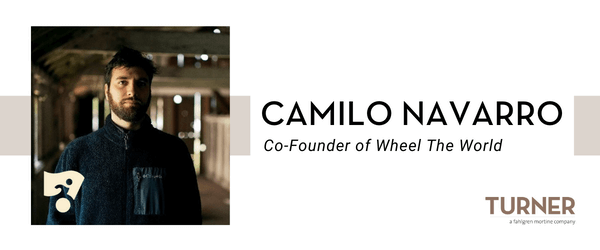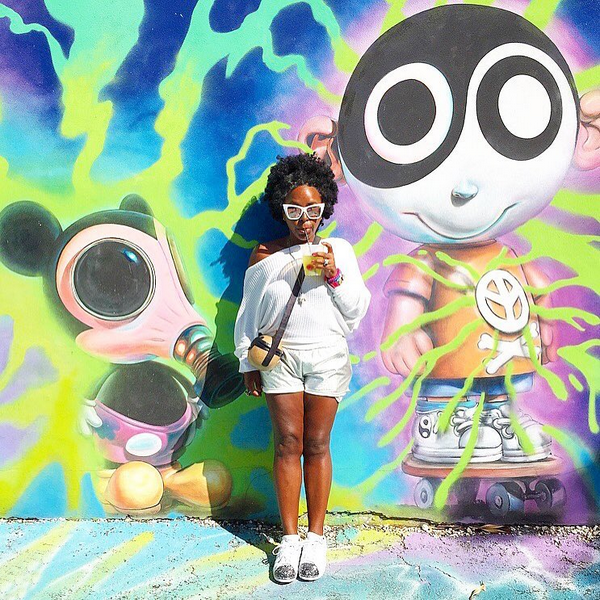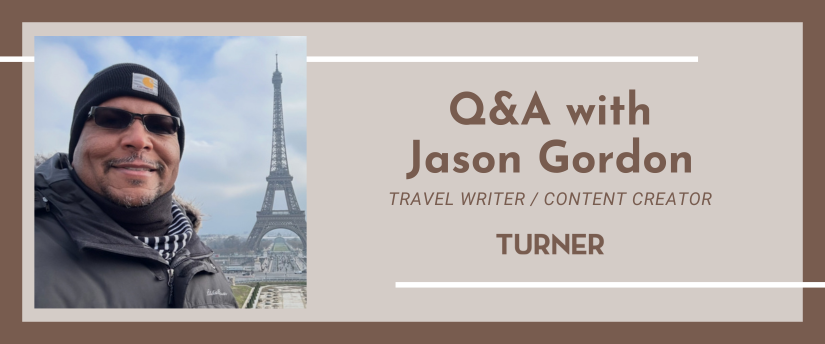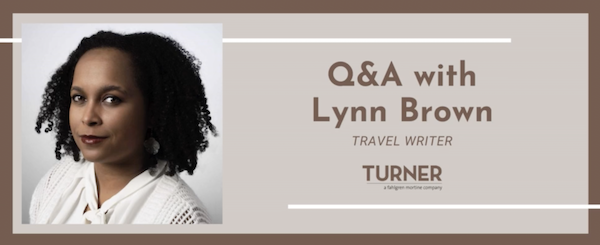TURNER Q&A: Sarah Greaves-Gabbadon / JetSetSarah
You’ve probably seen Sarah Greaves-Gabbadon’s byline in such outlets as Travel + Leisure, Condé Nast Traveler, Islands.com and many more. The...

Founded in 2017, Wheel The World has rapidly become the most comprehensive guide for travelers with disabilities to find and book accessible travel experiences.
The seed for the company was planted with a true adventure, as co-founders Camilo Navarro and Alvaro Silberstein made history on a 2016 journey through Torres del Paine National Park in Chilean Patagonia. Silberstein, who uses a wheelchair, became the first person with a disability to explore the park. And when the story went viral, Navarro and Silberstein realized that there was a vital need for a resource like Wheel The World.
Since then, they've been working to make the world accessible. TURNER spoke with Camilo to get his thoughts on his company and the state of the accessible travel world.
Looking back and kind of connecting the dots; when I was in school for business and economics, I did a project about social impact and social responsibility. I thought if students were able to use their skills to solve significant problems for society, it would be a win-win. You could put your skills into practice in a way that would be more fulfilling. I thought universities should just enforce social impact as a kind of academic requirement.
But it was just an idea. I was kind of a hypocrite, actually [laughs]. I went in the other direction and began working for the corporate sector developing real estate projects such as offices, hotels, and shopping mall centers. But I started feeling a little bit frustrated about my career. I knew I had to do something more meaningful. I started working for the Chilean government on the underground railway transport system, working to solve a reasonably important problem—how can make transportation more efficient for 40 percent of Santiago's de Chile population. That was something more compelling for me.
There wasn't the expectation of starting a company out of it. It was just pursuing this dream with my friend Alvaro Silberstein. I always thought that when you travel, it's not just tourism. Traveling is an inspiration. The smell, the colors—everything about a new place. It's a moment where you reflect, right? I thought: "My friend Alvaro and today's Co-Founder needs to be in Patagonia. How can we make that happen, given he is a wheelchair user?" Long story short, we became the first wheelchair-user expedition to conquer Torres del Paine, Patagonia. The story went viral, and people with disabilities started to reach out to us to replicate the same trip we did.
That's when my social impact idea started to make sense. We saw that the lack of accessibility was something affecting so many people. Not only the ones who wanted to travel to Patagonia but also the ones who wanted to explore Tokyo, London, Paris, New York, and wherever. That's when we felt like we needed to do something about it. Some stories behind companies are about looking for a problem to solve. For us, we found the problem very easily. People with disabilities where facing several problems when traveling. How can we help them do it? Not just in outdoorsy places but everywhere.
Yes, it was a real "a-ha" moment. Our product wasn't perfect at first—we had a lot to learn. But it was obvious that there was an audience. And as we went along, we saw what we had to improve. That was part of the journey. We got sort of dropped into this opportunity, but it was clear people wanted us to solve this problem. Still, we had some people saying we were absolutely crazy that we were going to start a company by taking people with disabilities into the mountains [laughs]. But we were bold enough and ultimately, we pursued it.
Exactly. And one thing to understand is that people with disabilities don't just travel by themselves. They travel with family and friends who are directly connected with them. So, we're talking about 1/3 of the world's population that can benefit from accessible travel. It's a paradigm we need to push and change. Having the opportunity to travel with, say, your grandparents—there's something magical that could be uncovered because of that. The population is aging—every one of us will have accessibility needs at some point in our lives. And when I think about aging, it's about traveling. When I'm older, what I would like to do the most is go around to enjoy these different parts of the world. That's another thing that encourages us to keep doing what we're doing.
There's definitely a lot more awareness. Awareness is the first engine that needs to be turned on. That's not just in the travel industry, but in all industries. But in the travel industry specifically, from airlines to hotels to tourist destinations, we've been seeing more awareness. There's a general feeling that people with disabilities are out there and they're consuming products and services that are not designed for them. And that needs to be changed. Society has become more inclusive, as well. In that way, people with disabilities have started to have access to resources they might not have had before.
For example, education—and as a consequence, they have disposable income. And they don't want to spend their money on products and services that are not designed for them. That's helping to change things. A personal goal for the future is showing how the travel industry can be an example of how other industries can become more accessible and inclusive. If we can show the world that we focused our company entirely on this segment of the population and we are building something scalable, big and sustainable, I think it could encourage other organizations to think differently. Maybe they'll hire more people with disabilities. Maybe they'll create more products and services with those people in mind.
Generally, the main problem with destinations is that many of them don't have a centralized place where travelers can learn all about accessibility. That makes it very hard for people with disabilities to understand whether this particular city or state is accessible to them. Remember that when you visit a destination, the journey isn't just the destination. There's the inspiration phase, thinking about where you could go. If that information isn't easily available, a traveler isn't going to be inspired. Then, there's all the other things—the flight, ground transportation, restaurants, hotels, attractions. That chain is broken right away if the information isn't there.
We're growing. We have close to 50 people working for us now and that's exciting. We multiplied our company by four times last year. Wheel The World is a project that requires a lot of passionate people who are interested in fixing this problem. So getting to this point is an important milestone. Who knows how long it will take to achieve our goal of getting millions of people with disabilities to be able to travel easier, but right now, we have our native platform. We're introducing many different features, such as group tours, cruises, referrals, and loyalty programs that hopefully will allow us to get there faster. We're improving our accessibility recommendations engine, one of our most iconic features, that recommends to users what hotel better fits their specific accessibility needs. It shows how accessible a place is for a specific user rather than generalizations.
I hope that 10 to 15 years from now, the world is going to be fully accessible. Accessibility is inevitable. If Wheel The World can help to accelerate that path, that would be entirely joyful. Even if we're not the most successful company in the world, I'm going to be happy making a contribution that ultimately will improve people with disabilities' lives.
Learn more at www.wheeltheworld.com.

You’ve probably seen Sarah Greaves-Gabbadon’s byline in such outlets as Travel + Leisure, Condé Nast Traveler, Islands.com and many more. The...

Driven by a deep-seated love for exploration, Jason Gordon has become a highly respected voice in the travel world and the cruise industry. As a...

Lynn Brown is a writer, professor, digital storyteller and traveler whose work centers on issues of race, place, culture and history. Currently the...